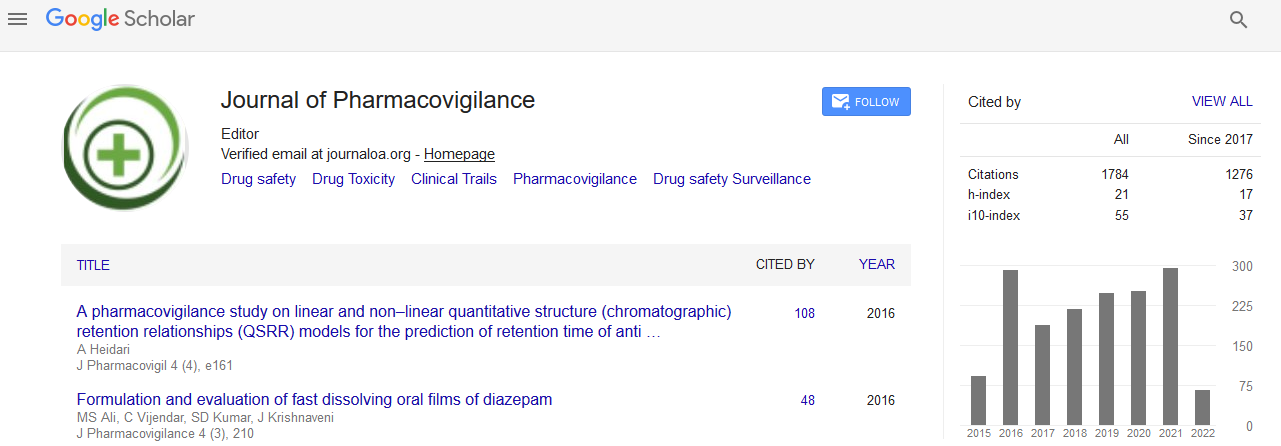Indexed In
- Open J Gate
- JournalTOCs
- The Global Impact Factor (GIF)
- RefSeek
- Hamdard University
- EBSCO A-Z
- OCLC- WorldCat
- Publons
- Euro Pub
- Google Scholar
Useful Links
Share This Page
Journal Flyer

Open Access Journals
- Agri and Aquaculture
- Biochemistry
- Bioinformatics & Systems Biology
- Business & Management
- Chemistry
- Clinical Sciences
- Engineering
- Food & Nutrition
- General Science
- Genetics & Molecular Biology
- Immunology & Microbiology
- Medical Sciences
- Neuroscience & Psychology
- Nursing & Health Care
- Pharmaceutical Sciences
Commentary - (2023) Volume 11, Issue 1
Drug Safety for Children and Adolescents: A Guide for Parents and Caretakers
Anthony Onoja*Received: 01-Jan-2023, Manuscript No. JP-22-20158; Editor assigned: 03-Jan-2023, Pre QC No. JP-22-20158(PQ); Reviewed: 17-Jan-2023, QC No. JP-22-20158; Revised: 24-Jan-2023, Manuscript No. JP-22-20158(R); Published: 31-Jan-2023, DOI: 10.35248/2329-6887.23.11.415
About the Study
As a parent or caretaker of a child, it's important to be aware of drug safety and how it can impact the health and well-being of your child. Prescription and over-the-counter drugs can be useful in treating a variety of ailments, but they can also be dangerous if not used correctly. In this guide, we'll cover some important things to keep in mind when it comes to drug safety for children and adolescents.
Understand the risks
Before giving your child any medication, it's important to understand the risks involved. Every drug has the potential for side effects, and some can be quite serious. Make sure to read the label carefully and talk to your child's healthcare provider if you have any concerns or questions. It's also important to be aware of any potential drug interactions, as some medications can interact with others and cause serious harm.
Always follow dosage instructions
One of the most important things you can do to ensure drug safety for your child is to always follow dosage instructions. Giving your child too much medication can be dangerous, and giving too little may not be effective. Be sure to use the measuring device provided with the medication, and never use a household spoon to measure liquid medication. If you're unsure about the correct dosage for your child, talk to their healthcare provider.
Keep medications stored safely
It's important to keep all medications out of reach of children, as some can be harmful or even fatal if ingested in large quantities. Store medications in a locked cabinet or other secure location, and keep them in their original containers with labels intact. Don't share medications between family members or friends, as different people may have different medical conditions or allergies that could be affected by the medication.
Be aware of allergies and side effects
Some children may be allergic to certain medications or may experience side effects when taking them. Be sure to talk to your child's healthcare provider about any allergies or medical conditions they have before giving them any medication. If your child experiences any side effects while taking a medication, stop giving it to them and talk to their healthcare provider right away.
Don't use expired medications
Expired medications can be ineffective or even harmful, so it's important to check the expiration date before giving your child any medication. If a medication has expired, don't use it –dispose of it properly according to the manufacturer's instructions or local regulations.
Don't rely on medication alone
While medications can be helpful in treating certain conditions, they shouldn't be relied upon as the sole treatment option. Encourage your child to adopt healthy habits such as eating a balanced diet, getting regular exercise, and getting enough sleep. If your child is struggling with a mental health issue, consider therapy or other forms of treatment in addition to medication.
Communicate with your child's healthcare provider
Communication with your child's healthcare provider is key to ensuring their drug safety. Be sure to let them know about any medications your child is taking, including over-the-counter drugs and supplements. Ask any questions you may have about medication safety, dosage, and side effects, and don't hesitate to call if you have concerns or notice any changes in your child's condition.
In conclusion, drug safety for children and adolescents is a critical concern for parents and caretakers. By understanding the risks of medication, following dosage instructions, keeping medications stored safely, being aware of allergies and side effects, not using expired medications, not relying on medication alone, and communicating with your child's healthcare provider, you can help ensure the health and well-being of your child.
Citation: Onoja A (2023) Drug Safety for Children and Adolescents: A Guide for Parents and Caretakers. J Pharmacovigil. 11:415.
Copyright: © 2023 Onoja A. This is an open-access article distributed under the terms of the Creative Commons Attribution License, which permits unrestricted use, distribution, and reproduction in any medium, provided the original author and source are credited.


